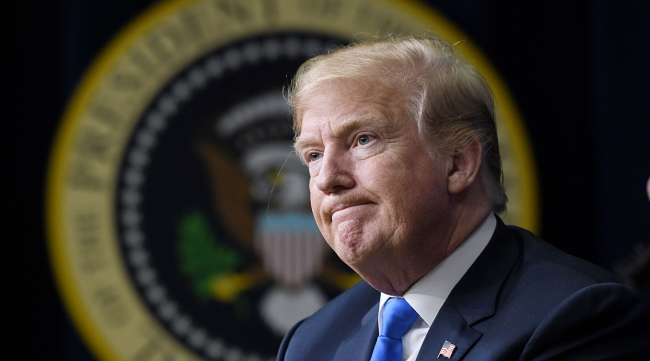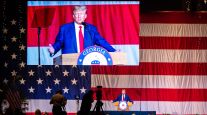Trump Deregulatory Efforts Flounder in Court

A year and a half into the Trump administration’s war against what it deems unneeded regulation, the legal record is coming into focus. And, according to law professors who follow regulation, it ain’t pretty.
In their haste to gut regulations, agencies got sloppy and tried to cut corners administratively, resulting in an unusually lopsided tally of court rulings against the agencies, two Georgetown University specialists in administrative law say.
“I think what you’re seeing here is agencies that are more focused on immediate, short-term political credit-claiming than they are about long-term, enduring victories,” William Buzbee, a law professor at Georgetown University Law Center who specializes in regulatory policy, said.
RELATED: Trump to seek repeal of California’s smog-fighting power
Upon taking office, Trump ordered the widespread rollback of regulations he said were hurting the economy. That, in turn, spurred a flurry of litigation around delaying existing Obama-era rules. Of 11 reported judicial decisions in those areas through June, 10 have gone in favor of the plaintiffs, according to Lisa Heinzerling, also a law professor at Georgetown.
Process Not Followed
The Administrative Procedure Act is the foundational statute that governs regulatory agencies’ rulemaking, requiring public notice, comment and explanation by the agency, Heinzerling said at a June event on regulatory policy.
“And at every stage, I would say, the government is now brazenly violating that simple setup,” said Heinzerling, who helped argue on behalf of Massachusetts in the landmark 2007 U.S. Supreme Court case that laid the foundation for EPA regulation of greenhouse gas emissions under the Clean Air Act.
An administration official declined to comment on any particular judicial decision, saying courts usually explain their reasoning when they issue their orders.
When agencies decide to stay or delay the effective date of a regulation they are supposed to issue a new rule with a new date, and that new rule would be subject to review by the Office of Information and Regulatory Affairs, the official said. OIRA is located within the White House’s Office of Management and Budget.
But in the Trump administration’s proposed delays, the courts found the full rulemaking process was not followed, sometimes lacked analysis and public comment, or had other procedural deficiencies, Buzbee said.
OIRA did not respond to several requests for comment by Bloomberg Government.
Shortcuts Continue
One example of the kind of rulemaking shortcut that regulatory analysts say can cause future legal problems occurred at the Environmental Protection Agency.
The EPA recently proposed a rule called strengthening transparency in regulatory science, which critics say was drafted with no input from the scientific community and only hastily reviewed by OIRA between April 19 and April 23, a five-day period that included a weekend.
An EPA calendar entry provided by the Union of Concerned Scientists to Bloomberg Government shows an event held April 24 at EPA headquarters to announce the proposed rule was being planned on April 9, long before the rule was even sent to OIRA for review.
After outcry from Congress and criticism from the EPA’s own Science Advisory Board, the initial 30-day public comment period for the rule was lengthened to 108 days. But concerns remain.
“I think what you’re seeing here is that EPA already has a pre-determined outcome that they want to see, and they’re just trying to do whatever they can to rush it through,” said Yogin Kothari, senior Washington representative at the Union of Concerned Scientists.
In what critics cite as a similar example, the U.S. Court of Appeals for the District of Columbia Circuit stayed on July 18 an attempt by the EPA to circumvent a 2016 rule that capped the production and sale of truck engine retrofitting kits.
Plaintiffs had argued that EPA was using its enforcement discretion to achieve an outcome it hadn’t been able to justify through rulemaking.
Lawsuits Mounting
Over the past year, researchers at the centrist Brookings Institution also have been tracking major deregulatory actions announced by the Trump administration, noting where there is litigation.
The litigation record on the proposed rule delays is evidence of how badly agencies are botching things, according to Buzbee.
Historically, it’s “exceedingly rare” for federal agencies to lose when they engage in policymaking, because they have the time and expertise to adjust policy, and courts will usually show them deference, Buzbee said.
“So, for agencies to be rejected by most courts is evidence of egregious illegality,” Buzbee said.
Under the Administrative Procedure Act, courts require agencies to offer a statutorily and legally justified rationale to reverse policy, Buzbee said. And yet, in case after case, Trump administration agencies have offered just a few lines of conclusory claims of illegality of the Obama-era rule, he said.
Patrick McLaughlin, director of economic research on regulation at the libertarian Mercatus Center at the George Mason University, said the administration has probably successfully delayed many more rules than the 11 Heinzerling focused on.
“The 11 rules that have actually become court cases became court cases because there was enough of a case for a plaintiff to take action. So it’s probably just a selection effect — the delays most likely to be overturned by a court are the ones that are brought to court,” McLaughlin said.
Industry Winners and Losers
If an agency can delay the effective date of a regulation or in some way send a signal that a regulation will not be enforced for months or years, there are huge monetary benefits for some companies, Buzbee said. On the other hand, state-of-the-art companies that want to think long-term about investing — sell products, devices, or services compliant with long-term regulatory shifts — are going to lose, he said.
Especially early in the Trump administration, many Obama-era regulations were “tossed off” in the Federal Register with at most a sentence or two of explanation, said Jeff Dubner, senior counsel at pro-regulation group Democracy Forward.
“And when there was explanation you could see just how transparent it was, and that has led directly to court after court striking down agency actions at a rate that is unprecedented because the conduct is unprecedented,” Dubner said.
A favorable court ruling is expected soon on a lawsuit challenging a Department of Energy delay in setting efficiency standards for air conditioners, which was delayed on the basis of submissions from one manufacturer, Dubner said. His organization is part of the suit.
One view is the industry that wants a delay can benefit even if it is later held unlawful, getting, for example, another year to sell their uncertifiable air conditioners, Dubner said.
But in some cases, sloppiness really does prevent the kind of deregulation the administration wants, Dubner said.
The Department of Homeland Security, for example, tried to change immigration policy by delaying the international entrepreneur rule, but the agency’s failure to follow the Administrative Procedure Act means the rule is still in place, he said.


